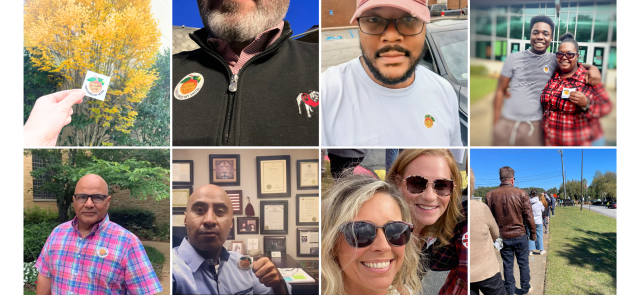Stay ahead of the curve as a political insider with deep policy analysis, daily briefings and policy-shaping tools.
Request a DemoState Ag Commissioner on raising awareness of plight of farmers

Agriculture Commissioner Tyler Harper walks the property at his family farm in Ocilla. (Credit: Georgia Dept. of Agriculture)
Farming is so grueling that some farmers have given their life for it. Literally. More than 100 Georgia farmers have died by suicide since 2008.
Georgia Agriculture Commissioner Tyler Harper, himself a farmer, recently teamed with the heads of the state Department of Behavioral Health and Developmental Disabilities and the extension program at the University of Georgia to deal with the problem. It’s a problem that not only affects farmers but farm workers and ultimately all of us as consumers.
State Affairs spoke with Harper about his plans for addressing the problem. The conversation has been edited for length and brevity.
Q. What led to the collaboration among you, the state behavioral health department and UGA extension regarding farmers and their mental health?
A. Well, a couple of things. This is something that’s kind of been an ongoing collaboration but something Commissioner [Kevin] Tanner and myself and the folks at the University of Georgia have decided to make a little more of a priority for our agencies.
We want to ensure that we’re raising awareness of mental health in rural Georgia and the resources that are available to our farmers and producers across the state, and ensuring that they have access to the care they deserve. Another thing that made this more of a priority is the study that Mercer University did last year on the ag sector. We found some pretty staggering statistics. That’s one of those things that led to us focusing more on those issues.
I’m really excited about the partnership. It’s become a priority of ours.
Q. Now that you’ve made this issue a priority, will you seek legislation or some action through the Legislature next year to address the problem?
A. We absolutely are supportive of the state allocating more funds to address mental health in our rural communities. As for the Department of Agriculture’s efforts, our state funds are entirely dedicated to carrying out our regulatory mission, so we rely on federal grants available through the farm bill to fund our mental health programming.
Q. The farm bill remains stalled in Congress. How concerned are you about that and its impact on Georgia farmers?
A. Well, it’s something that’s got to get addressed and got to get across the finish line. When it comes to ag policy, it is very vital. And I’ll be honest with you, it is one of those things that impacts farmers. The fact [that] we don’t have a Farm bill passed, this is part of those things that weigh on the decisions that [farmers] make and help them address the issues that need to be addressed. Getting a farm bill done is a priority. There are resources in the farm bill related to mental health and insurance. The federal government understands it’s something that we need to work to address and I look forward to continuing to work with our delegation here in our state to ensure we get the resources that we can in the farm bill and all the appropriate areas, including mental health resources.
Q. The ag department and the two other agencies have spent a combined $5.3 million in the last few years on various programs to make farmers and others in rural communities across the state aware of available resources. Is that enough money to address mental health challenges in agriculture, given what you’re finding?
A. That’s something we’ve got to continually evaluate to ensure that we’re putting the appropriate resources where they’re needed. I think the more we get into this, the more opportunities we have to speak with those that are impacted. I think [it] will give us a clearer picture of the resources we need.
Q. You’re a seventh generation farmer. Have you had times when the stress of farming has overwhelmed you personally? If so, what did you do?
A. Well, you know even in my own operation, you face those challenges and some of the difficulties and you find ways to address them, whether that’s through talking with family or working that out through those that are close to you. I think every producer gets faced with those situations, including myself. So you’ve got to ensure that you’re willing to reach out to those that can help you address those situations when you need them.
If you or someone you know is in crisis, please call the 988 Suicide and Crisis Lifeline, which has trained listeners standing by ready to help. Visit 988lifeline.org for crisis chat services or for more information.
Have questions, comments or tips? Contact Tammy Joyner on X @lvjoyner or at [email protected].
X @StateAffairsGA
Instagram@StateAffairsGA
Facebook @StateAffairsGA
LinkedIn @StateAffairs
In the (state)house: Meet the newest members of the Georgia legislature
When lawmakers reconvene at the state Capitol on Jan. 13, there’ll be a cadre of new faces in the 236-member Georgia General Assembly, one of the nation’s largest state legislatures. All 236 statehouse seats were up for election this year. Most candidates ran unopposed. Incumbents in contested races easily kept their seats, with the exception …
2 young Democrats win Statehouse seats as Republicans hold majority
ATLANTA — Many Statehouse incumbents appeared to beat back challengers Tuesday, ensuring their return to the Capitol in January. Republicans retain control of the House and Senate. Two Generation Z candidates will join the 236-member Legislature as new members of the House of Representatives: Democrats Bryce Berry and Gabriel Sanchez. Berry, a 22-year-old Atlanta middle …
Election night 2024: What to watch for as the results roll in
It’s been a long time coming, but we’ve finally made it to Election Day 2024. Today’s most anticipated race is, of course, the presidential contest between Vice President Kamala Harris and former President Donald Trump. The pair have spent a combined $25 million in new media ads alone in the past two weeks in this …
Election Day 2024: State Affairs brings you the fair, transparent, nonpartisan coverage you deserve
Election Day is here and State Affairs stands ready to bring you the kind of election coverage you deserve — fair, transparent and rooted in a commitment to nonpartisanship. Across the states, voters are casting their ballots, deciding on leaders and policies that will shape our communities and futures. And as the results come in, …




